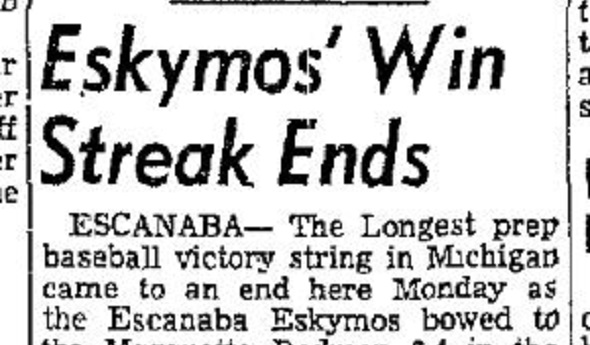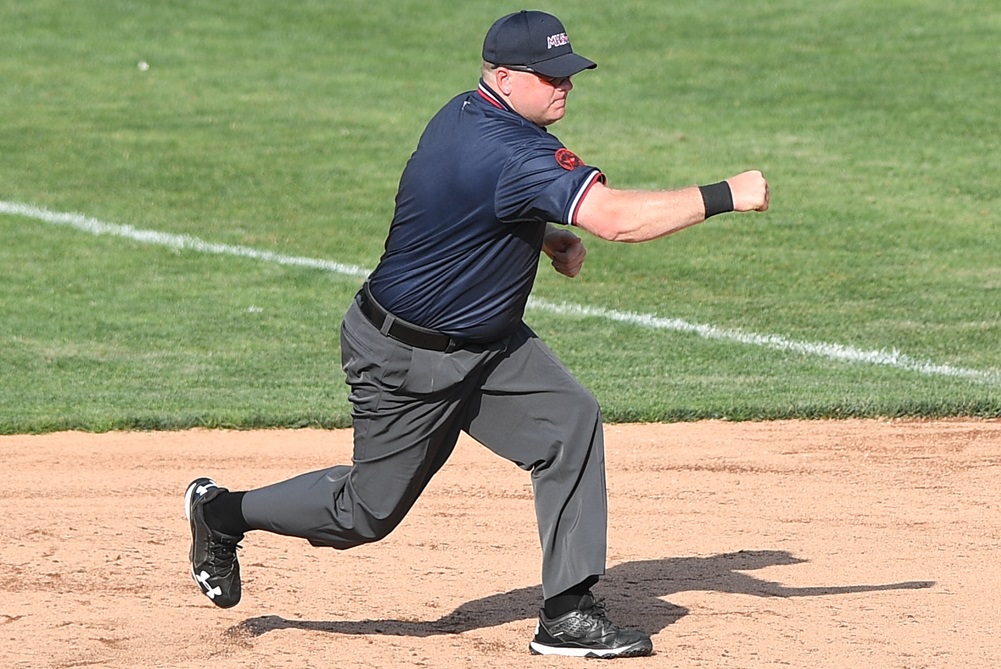
#TBT: Escanaba Streaks into History
May 21, 2015
By Geoff Kimmerly
Second Half editor
Thanks in part by “lanky righthander” Harlan Breitzman and his 14 pitching wins over the 1954 and 1955 seasons, Escanaba entered the spring of 1956 having won 43 straight games.
Statewide news at the time, that streak ended in the season opener with a 6-4 loss to rival Marquette. But it remains one of the longest in MHSAA baseball history – and certainly the longest in terms of seasons, stretching over six during the early decades of high school baseball, when many teams played far fewer games than at present and with the start of an MHSAA Tournament for the sport still two decades away.
Escanaba won 43 straight beginning with its third game of 1950 through the end of the 1955 season. The team played eight games at most during those seasons – but strung together five straight perfect runs. According to a Detroit Times story previewing the start of Escanaba’s 1956 campaign, five of the team’s eight 1955 wins were shutouts. The Times also reported that Breitzman, a graduate the previous spring, had signed with the Brooklyn Dodgers.
At the time, the Eskymos’ streak would’ve ranked behind only that of Muskegon’s 1941-45 teams that won 55 straight. Homer owns Michigan’s longest (and the nation’s third longest) baseball winning streak: 75 games from opening day 2004 until a 7-6 loss to Saginaw Nouvel in the 2005 Division 3 Final.
(Research courtesy of MHSAA historian Ron Pesch.)
PHOTO: An Ironwood Daily Globe headline announces the end of the Escanaba baseball team's winning streak at the start of the 1956 season.

Be the Referee: Fair or Foul?
By
Paige Winne
MHSAA Marketing & Social Media Coordinator
April 15, 2025
Be The Referee is a series of short messages designed to help educate people on the rules of different sports, to help them better understand the art of officiating, and to recruit officials.
Below is this week's segment – Fair or Foul? - Listen
A batter hits a line drive down the first base line. The first baseman, about a foot inside the line, leaps at the ball before it passes first base and deflects it into foul territory.
The batter, thinking the ball is foul, lets up and returns to the batter’s box.
The catcher trailing the play picks up the ball and runs over to first and steps on the bag. What’s the call?
Because the ball was over fair territory when touched by the first baseman, it doesn’t matter where the deflected ball lands – it’s a fair ball, a live ball. The out stands, as the catcher touched first base with the ball before the batter got to the base.
On plays like this, it’s incumbent on the umpires to make a clear signal to leave no doubt that the ball is live.
Previous 2024-25 Editions
April 8: Girls Lacrosse New Stoppage Rule - Listen
April 1: Base Runner Interference - Listen
March 25: Pine Tar Usage - Listen
March 11: Basketball Replay - Listen
March 4: Gymnastics Deduction - Listen
Feb. 25: Competitive Cheer Inversion - Listen
Feb. 18: Ice Hockey Delay of Game - Listen
Feb. 11: Ski Helmets - Listen
Feb. 4: Wrestling In Bounds or Out? - Listen
Jan. 21: Block or Charge? - Listen
Jan. 14: Out of Bounds, In Play - Listen
Jan. 7: Wrestling Scoring - Listen
Dec. 17: Bowling Ball Rules - Listen
Dec. 10: Neck Laceration Protector - Listen
Dec. 3: Basketball Goaltending - Listen
Nov. 26: 11-Player Finals Replay - Listen
Nov. 19: 8-Player vs. 11-Player Football - Listen
Nov. 12: Back Row Setter - Listen
Nov. 5: Football OT - Listen
Oct. 29: Officials Registration - Listen
Oct. 22: Volleyball Serve - Listen
Oct. 15: "You Make the Call" - Soccer Offside - Listen
Oct. 8: Roughing the Passer - Listen
Oct. 1: Abnormal Course Condition - Listen
Sept. 25: Tennis Nets - Listen
Sept. 18: Libero - Listen
Sept. 10: Cross Country Uniforms - Listen
Sept. 3: Soccer Handling - Listen
Aug. 24: Football Holding - Listen

